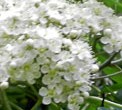 Also known as rowan, mountain ash is a deciduous tree native to Europe, Asia and North Africa where it does best in cool mountainous areas. It is a member of the rose family , Rosaceae, that also includes cherries, hawthorns, and blackberries, and is not related to the true ash , Fraxinus, which is in the olive family, Oleaceae. The trees have smooth grayish-brown bark, a loose round crown, slender trunk, and graceful spreading branches. The fern-like leaves are five to seven inches long and pinnately compound with nine to fifteen lanceolate-shaped leaflets ¾ to inches long. The leaflets are gray-green above, paler beneath and turn yellow to orange or reddish purple in fall. In late spring small yellowish white flowers 1/3 inch across appear in large flat clusters four to six inches across and are followed in the fall by clusters of green berries 3/8 in diameter that turn orange- red in the fall and are attractive to birds. Cultivars are available with yellow or pink berries. Mountain ash is a good choice for a patio, lawn, specimen or container. The genus name, Sorbus , is the Latin name for service tree. The specific epithet, aucuparia, comes from the Latin words avis meaning bird, and capere meaning to catch, and refers to the use of the fruit as bait when hunting birds.
Also known as rowan, mountain ash is a deciduous tree native to Europe, Asia and North Africa where it does best in cool mountainous areas. It is a member of the rose family , Rosaceae, that also includes cherries, hawthorns, and blackberries, and is not related to the true ash , Fraxinus, which is in the olive family, Oleaceae. The trees have smooth grayish-brown bark, a loose round crown, slender trunk, and graceful spreading branches. The fern-like leaves are five to seven inches long and pinnately compound with nine to fifteen lanceolate-shaped leaflets ¾ to inches long. The leaflets are gray-green above, paler beneath and turn yellow to orange or reddish purple in fall. In late spring small yellowish white flowers 1/3 inch across appear in large flat clusters four to six inches across and are followed in the fall by clusters of green berries 3/8 in diameter that turn orange- red in the fall and are attractive to birds. Cultivars are available with yellow or pink berries. Mountain ash is a good choice for a patio, lawn, specimen or container. The genus name, Sorbus , is the Latin name for service tree. The specific epithet, aucuparia, comes from the Latin words avis meaning bird, and capere meaning to catch, and refers to the use of the fruit as bait when hunting birds.
 Type: Deciduous, flowering tree
Type: Deciduous, flowering tree
Outstanding Feature: Fruit, flower, fall color
Form: Oval
Growth Rate: Rapid
Bloom: Small yellowish white flowers 1/3 inch across in large flat clusters four to six inches across in late spring
Size: 15-40’ H x 8-20’ W
Light: Full sun
Soil: Prefers moist, well-drained, acidic
Hardiness: Zones 3-6
Care: Prune in winter when young to establish a framework.
Pests and Diseases: aphids, blister mites, sawflies, scale, borers, cankers, fireblight, scab, crown gall, powdery mildew, rust, silver leaf. Stressed trees are particular susceptible.
Propagation: Seed, softwood cuttings, grafting